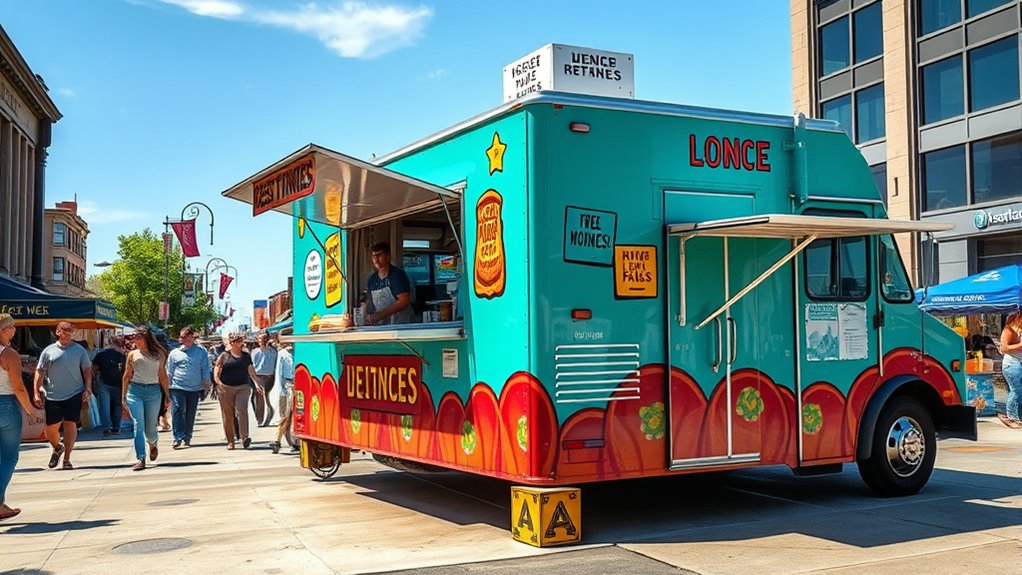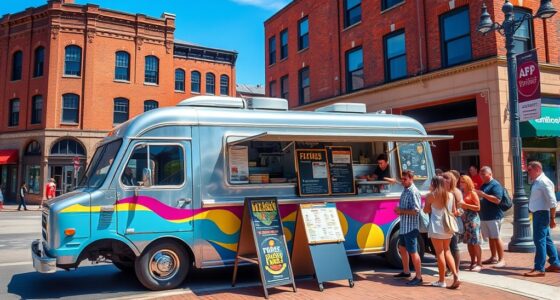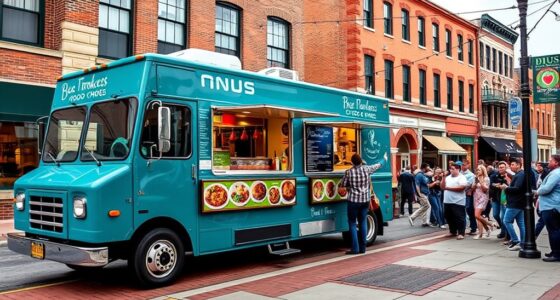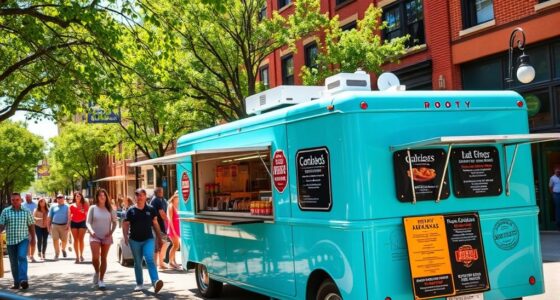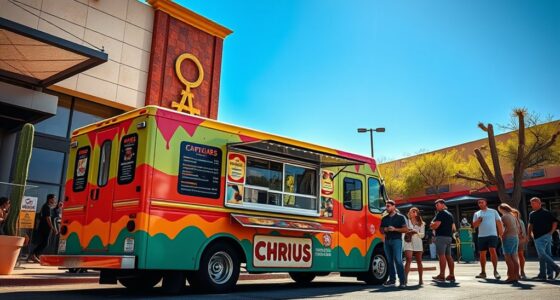To start a food truck in Des Moines, you need to secure permits like a Mobile Food Unit License, Iowa Retail Sales Tax Permit, and pass fire inspections. Costs include truck buying ($40,000-$150,000), permits around $250 yearly, and monthly expenses for fuel and maintenance. Find approved spots like breweries and festivals, but follow restrictions near schools or parks. Planning compliant menus and using marketing strategies like social media can boost your success—exploring these details can set you on the right path.
Key Takeaways
- Complete required permits, including Mobile Food Unit License, Fire Inspection, and Iowa Retail Sales Tax Permit, at least 30 days before opening.
- Budget between $40,000–$150,000 for truck purchase, plus $2,300–$3,300 for initial inventory and approximately $250 annually for permits and inspections.
- Operate in approved locations like brewery lots, festivals, and high-traffic street corners with proper zoning and owner permissions.
- Ensure menu compliance with Iowa regulations, focusing on prepackaged foods or limited prep, and maintain equipment for safety and health standards.
- Promote your food truck via social media, participate in local events, and implement loyalty programs to attract and retain customers.
Navigating Permits and Licensing Requirements in Des Moines
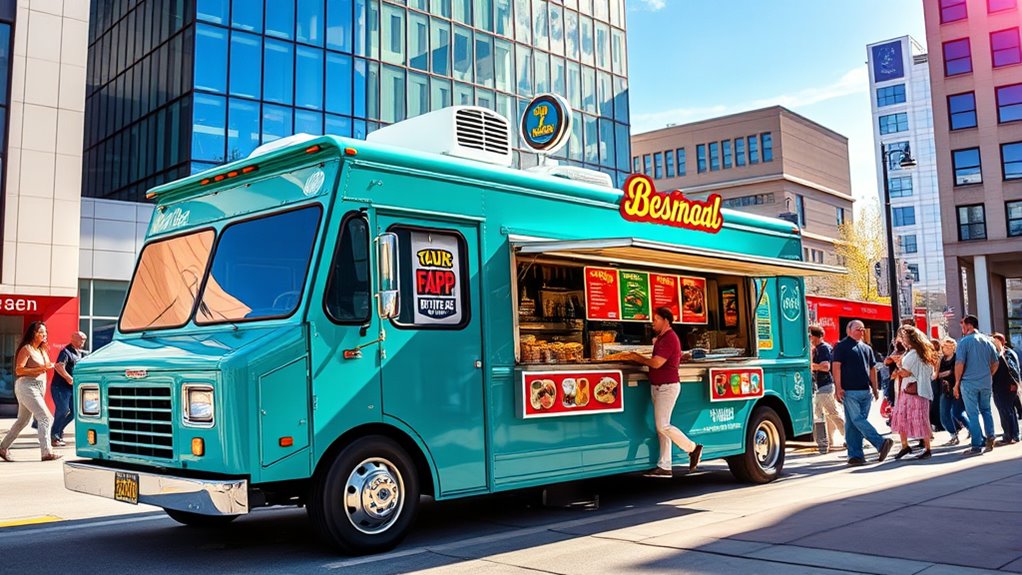
Managing the permits and licensing requirements for food trucks in Des Moines can seem complex, but understanding the key steps makes the process manageable. First, you’ll need to complete the Mobile Food Vendor Application, including an acknowledgment form and pay the required fees to the City of Des Moines. You’ll also submit a Fire Inspection Form, which the Des Moines Fire Department inspects on the first and third Wednesdays of each month. Additionally, provide a copy of your Iowa Retail Sales Tax Permit and the Mobile Food Unit License from the Iowa Department of Inspections and Appeals. If using a commissary kitchen, supply its food establishment license. You must also obtain a county license where your truck is stored, and out-of-state units need an Iowa license. Submitting applications at least 30 days before opening guarantees ample processing time. Incorporating organizational strategies such as creating a checklist can help ensure all permits are secured on time and reduce the risk of delays.
Understanding the Costs Involved in Operating a Food Truck
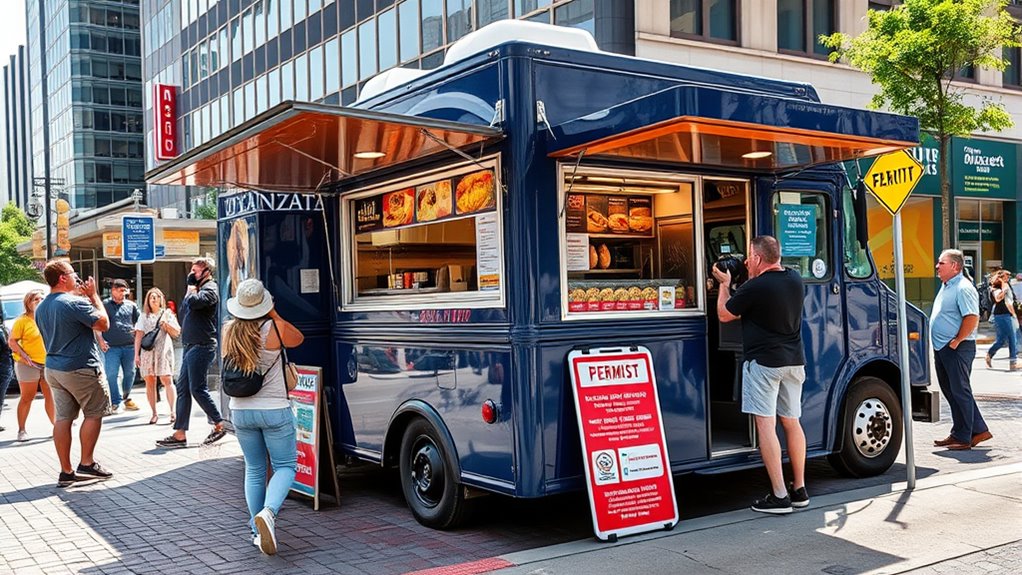
Starting a food truck business involves various costs that you need to plan for carefully. The initial investment for a truck ranges from $40,000 to $150,000, depending on condition and customization. You’ll also need about $2,000 to $3,000 for inventory, plus roughly $300 for serveware. Licensing and permits in Iowa cost around $250 annually, with additional inspection fees. Ongoing expenses include fuel and maintenance ($500–$1,000 monthly), insurance, staff wages, utilities, and replenishing supplies. Location can significantly influence your costs and potential customer base, so choosing the right spot is crucial. Consider these costs as you prepare:
- Purchasing and customizing your truck
- Initial food and serveware supplies
- Licensing, permits, and inspections
- Monthly fuel, maintenance, and insurance
- Knowledge of regulations is essential to ensure compliance and avoid fines.
Careful budgeting guarantees you’re financially prepared to operate smoothly and avoid surprises down the line.
Choosing Approved Locations and Recognizing Operating Restrictions
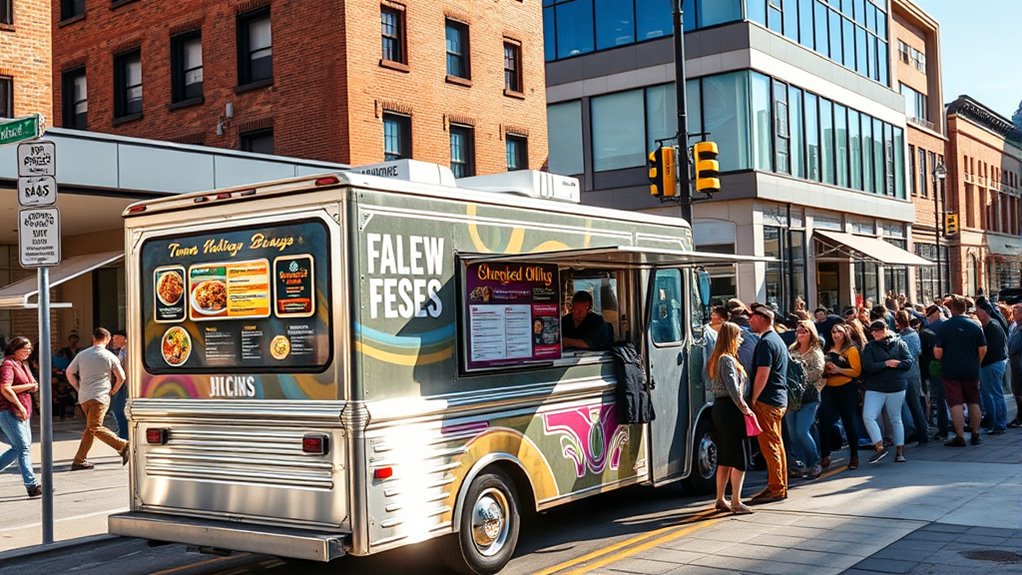
Choosing the right locations is essential for your food truck’s success, but it’s important to operate only in approved areas to stay compliant with local regulations. In Des Moines, common approved spots include brewery parking lots like Brightside Aleworks and Confluence Brewing, downtown festivals, and event parks. You can also operate in commercial zones such as Aurora Business Park and Cowles Commons, or high-traffic street corners near 73rd Street and Hickman Road. Ensure you operate on property zoned for commercial use, with owner permission if on private lots. Avoid restrictions near schools, parks, or existing food establishments, and check if downtown zones limit street vending. Always secure permits from relevant departments and follow time, noise, and signage regulations to stay compliant. Understanding prophetic dreams may seem unrelated, but some vendors find that visualizing ideal locations through such dreams can boost confidence and clarity in their planning process.
Planning Menus and Meeting Equipment Standards
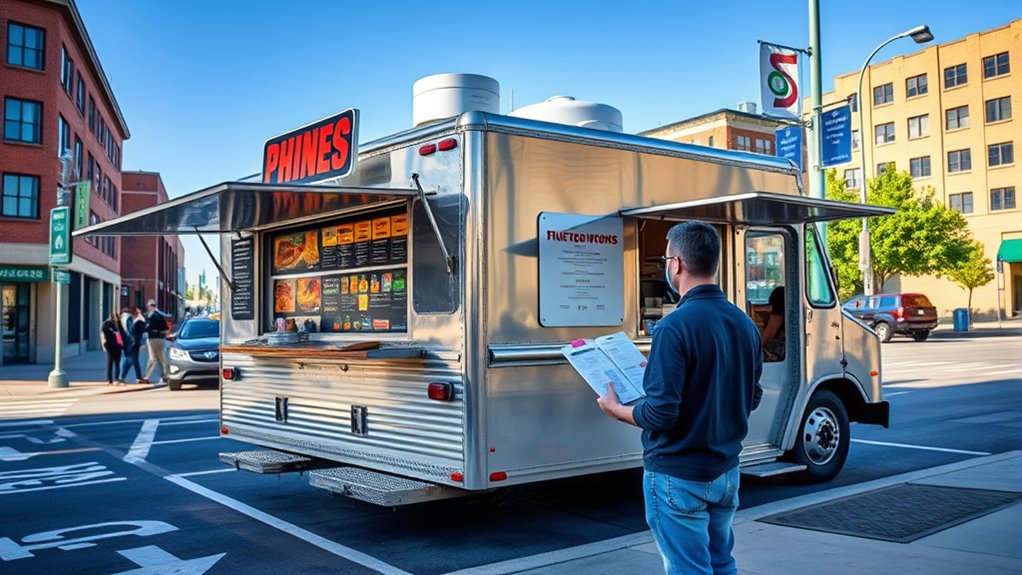
Planning your menu and guaranteeing your equipment meets standards are essential steps in operating a compliant and successful food truck in Des Moines. Your menu must align with Iowa’s mobile food unit classifications, which restrict on-site preparation based on your truck’s category. For example, Class I units serve only prepackaged foods, while Class III can handle more complex items but still avoid outdoor cooking setups. Make sure your equipment supports food safety: – Refrigeration units that maintain proper temperatures – Hot holding equipment for cooked foods – Sanitation facilities like hand sinks and waste disposal – Fire safety measures for outdoor cooking setups, if applicable. Ensuring your menu items are consistent with food safety regulations and that your equipment is properly maintained can prevent violations during inspections. Your equipment should also be compliant with local health department inspections, which require regular maintenance and updates. Your menu and equipment should work together to ensure safety, compliance, and efficiency on the road.
Effective Marketing Strategies for Food Truck Success
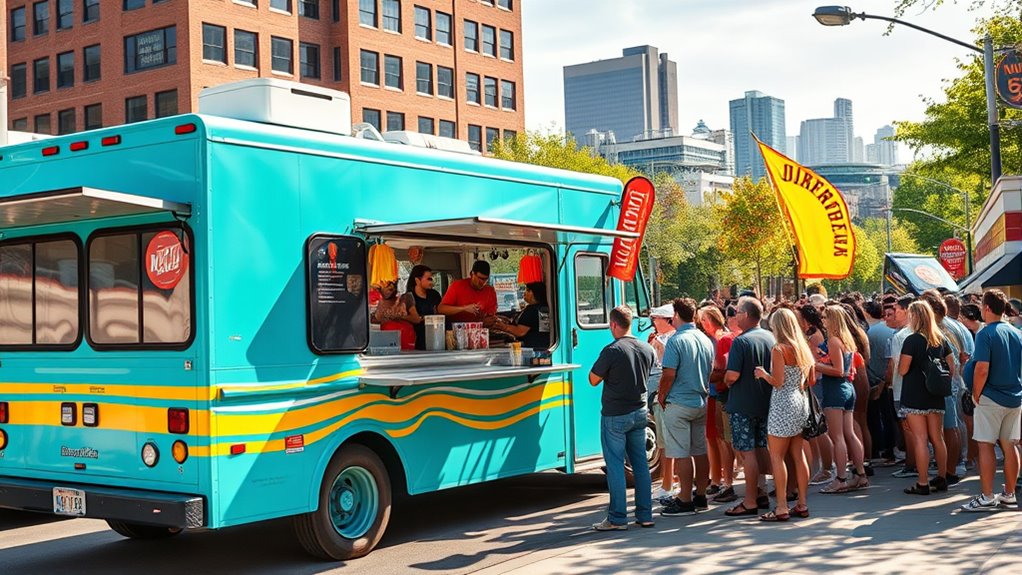
Effective marketing is essential for transforming your food truck from a local favorite into a thriving business. Social media is a powerful tool; 68% of food truck owners use platforms like Facebook, which 75% favor. These campaigns can boost sales by 20% and increase customer spending by 15%. Use the following strategies to maximize impact:
| Strategy | Benefit |
|---|---|
| Social media promotion | Builds brand awareness |
| Participating in local events | Increases visibility |
| Loyalty programs | Encourages repeat business |
Leverage community events and collaborations to grow your reputation. Also, track customer preferences with data analytics to refine your marketing efforts. Incorporating digital tools like GPS, analytics, and review platforms enables better customer targeting and feedback management. Utilizing targeted marketing techniques can help you reach the right audience more efficiently. Combining these approaches guarantees you reach the right audience and turn followers into loyal customers.
Frequently Asked Questions
How Long Does the Permit Approval Process Typically Take in Des Moines?
You’re probably wondering how long the permit approval process takes in Des Moines. Usually, it takes about 10-15 business days for vendor permits, but health inspections and plan reviews can extend that to 3-4 weeks. To avoid delays, make sure your application is complete, includes all required documents, and is submitted early. Keep in mind, inspections and multiple permits may add extra time, so plan ahead to stay on schedule.
Are There Specific Health Certifications Required for Food Truck Employees?
Did you know that Iowa requires all food truck employees to complete approved food safety training? You’ll need your staff to pass a 2-hour course and exam, plus guarantee at least one manager holds a certified Food Manager credential, valid for five years. This certification aligns with FDA standards, covering hygiene, cross-contamination, and temperature control. Staying certified not only keeps you compliant but also builds customer trust in your food safety practices.
Can I Operate a Food Truck on Residential Private Property in Des Moines?
You can operate a food truck on your residential private property in Des Moines, but you need permission from the property owner first. You must also obtain a Mobile Food Vendor Permit, pay applicable fees, and make sure your truck meets health and safety regulations. Be aware of parking rules, operating hours, and proximity restrictions near other businesses or public entrances. Coordinate with city officials for any additional permits or site-specific approvals.
What Are the Penalties for Operating Without Proper Permits in Des Moines?
Imagine getting caught operating without proper permits—what might that cost you? In Des Moines, you face civil penalties up to twice the license fee, or $100 per violation. Your license could be suspended or revoked, and you might face fines, legal costs, and forced closure. Non-compliance also risks safety violations, which can lead to more severe penalties. Staying compliant isn’t just smart—it’s essential to keep your business running smoothly.
Are There Any Grants or Financial Assistance Programs Available for New Food Truck Vendors?
You’ll find several grants and financial aid programs for new food truck vendors in Iowa. The Iowa Economic Development Authority offers Rural Innovation Grants supporting equipment upgrades, while Main Street Iowa’s Open 4 Business contest provides funding for growth projects. Additionally, Choose Iowa Value-Added Grants help fund food-related initiatives. Keep an eye on application deadlines and prepare detailed project proposals to increase your chances of securing these funds, which can cover equipment and expansion costs.
Conclusion
So, you’ve got the permits, the menu, and the perfect location—everything’s set. But don’t forget, the real trick is attracting customers when everyone’s already busy chasing their next meal. Ironically, the biggest challenge isn’t the paperwork or the equipment; it’s standing out in a crowded food scene. So, while you’ve checked all the boxes, remember that the true secret to success is simply cooking up something irresistible—because that’s what really keeps people coming back.
